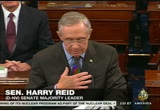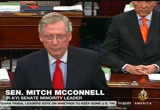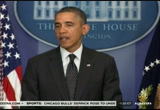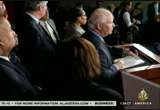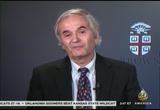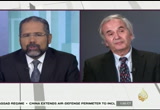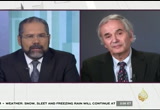tv Inside Story Al Jazeera November 24, 2013 2:30am-3:01am EST
2:30 am
if you were holding outz. hope that bipartisanship still had aerolite to play, you can give up. today the democratic leader harry reid launched the so called nuclear option and removed the minorities ability to exercise what little power it had left, to block president obama's judicial nominees. frustrated with the g.o.p.'s long list of obstructive judges and agency heads, the move by the democrats upended 225 years of senate history,
2:31 am
and significantly alters the day-to-day operation of the upper chamber. we'll talk about it all on this edition of "inside story." but fist this background. >> the american people believe congress is broken. the american people believe the senate is broken. and i believe the american people are right. at the start of the session, harry reid made history, and called for a rule change that would allow an up or down vote or judicial nominations and executive decisions. >> the change would ensure nominations and up or down vote, on confirmation. yes, no. the rule change will make all nominations other than the supreme court a majority threshold vote. yes or no. the senate is a living thing. and to survive it must change as it has over the history of this great country.
2:32 am
to the average american, adapting the rules to make the senate work again is just common sense. this is not about democrats verses republicans, this is about making washington work, regardless of who controls the senate. to remain relevant and effective as an institution, the senate mulled evolve to meet the challenges of this modern era. >> after he spoke, minority leader took to the floor. >> soy suggest our colleagues take a time out. stop trying to jam up, work with us, instead to confirm vacancies that need to be filled. which we have been doing. this rule change has gone from being a threat to an annual threat, now to a quarterly threat. how many times have we been threatened? do what i say, or we'll break the rules to change
2:33 am
the rules. confirm everybody, 100%. let me say we are not interested in having a gun put to our heads any longer. >> in the end, after several procedure moves -. >> the rules were changed. just a few hours after the senate made history, the president went to the briefing room. noting that both he and his vie president the former members of the senate, stressed his respect for the body's traditions, however. >> the american people's business is far too important to keep falling prey day after day to washington politics. we both value any senate's duty to advice and consent. it's important. and we take that very seriously. but -- a few now refuse to treat that duty of advise and consent with
2:34 am
the respect that it deserves. it's no longer used in a responsible way to govern. it's rather used as a reckless and relentless tool to grind all business to a halt. and that's not what our founders intended. >> what started all this was president obama's judicial nominations when a republican filibuster prevented judicial nominee from joining the u.s. court of appeals for the district of columbia. wilt kins is the third obama nominee this month blocked by republicans. the circuit is seen as one of the most important courts only average, more than 60% of the cases heard there involve the federal government. agencies and federal actions. judge wilkins currently serves on the u.s. district court, for the district of columbia. before that, he was an attorney. leading several high profile civil rights lawsuits. before wilkins appointment was filibustered two other obama nominees also faced the same fate just this month.
2:35 am
some republicans insist the three vacant seats need to be scrapped all together. once again they are threatening to break the rules of the senate, in order to change the rules of the senate. and other what? over what? over a court that doesn't even have enough work to do? millions of americans are hurting because of a law washington democrats forced pong them, and what do they do about it? they cook up some fake fight over judges. a fake fight over judges. that aren't even needed. >> the move is also used to block executive branch appointments. in march, the an pointment to head the consumer protection bureau was blocked by a filibuster, at the time, republicans senators said
2:36 am
they'd continue to block the confirmation, until the democrats agreed to make structural changes to the agency. october, congressman to head the federal housing finance agency. at that time, the g.o.p. admitted the action had more 20 do with unrelated issues. i am going to block every appointment until they are made available to congress. there's a long tradition of using the filibuster in this one, just ask president george w bush who had dozens of his nominees blocked. >> a judicial nomination should be a moment of pride for nominees and their families. not the beginning of an ugly battle. and the confirmation process should befit the greatest democracy in the world. and not look like a bad episode of survivor. >> last year, president
2:37 am
obama side stepped the g.o.p. wall, by making three appointments to the national labor relations board, during the senate's winter holidays. two chamber at the time was in proform ma session. the lawsuit over this case is currently before the supreme court. we'll discuss the arguments for and against the so called nuclear option, a rules change that allows presidential nominees to proceed with a simple majority in just a moment, we are now joined by victoria nurse. she is a professor of law at georgetown unit, she is nominated by president obama to serve on the united states court of appeals for the 7th circuit. profuser nurse withdrew her nomination, after a home state senator put her nomination on hold and it became clear she
2:38 am
would not be confirmed. welcome to inside story. >> thank you for having me. >>ly stipulate that most people watching this will never be nominated for a federal anything, so tell people what that is like? when you enter the process, do you give away a lot? your personal life, your personal details is it a sacrifice to say yes when the president calls in. >> absolutely. it was a four year process. of being vetted not only by the white house, the justice departments, i had taught five different law scoots. i was lucky enough to teach and visit at yale, and i had 11 fbi agents scouring the country. i sent up 4,000 pages of documents in my writings both writings that i had worked on when i had been a staffner the senate.
2:39 am
it's pass nateing to me because i had worked in government as a young lawyer, and had security clearances since i was 30 years old, but this would all have tock redone. >> you open up your life, was your fitness for office ever a question that was hashed out by members of the senate? >> no. offense subject to something called the blue slip. and there's a difference between a blue slip and a filibuster. a blue slip is a single senator who chooses to block a nominee. and that senator does it -- it's a kind of privilege that the senator chooses to say i dislike this nominee. this nominee is from my
2:40 am
state, i was nominated from wisconsin. where i had taught for many many years. and he decided to stay no. this nominee should not go forward, should no go forward to the committee. and this privilege has been recognized for a very long time in the senate. but it is not very well known. >> so never mind 50 votes or 60 votes, this is a minority of one that kept you from getting a hearing? >> that's correct. it's in some case a preverse honor. the chief justice, our current chief justice, was nominated to the d.c. circuit when he was 39 years old, and he was blue slipped. sometimes you are blue slipped precisely because there's nothing in the record that would lead to a filibuster. precisely because there's a very tiny minority that might be against you, but there's not enough to stop the nomination. so one person has to stand up and do it.
2:41 am
looking at the nominees for the d.c. court, looking at your unexperience, and from the perspective of someone that teaches law, is this a process that reflects what the framers had in mind when they layed out the rules for advise and consent. >> i certainly don't believe that the process is currently conducted is something that could possibly envisioned. and my first law review article was on the federalist paper, and i teach constitutional history. and here is why. supreme court nominees have always been the subject. even from 1789. so he was promptly subject to no consent by the senate. so for the supreme court, there has always been -- they have always been highly politically charged.
2:42 am
but what has happened in the last 40 years is this has trickled down to the court of amiles level, and to the district court level. and it's truly unfortunate, because i think it has a negative effect on those who are the most qualified to serve. those who have the widest experience, those who should be easy -- it should be easy to confirm them. so the framers believed in a senatorial advice role, but it was never this bill political show. short of the supreme court. >> so now that you have said that, looking back at recent history, the inch is still pretty wet on this new rule to take down the 60 votes needed and move to a simple
2:43 am
51-49 majority. do you think that's the right move at this time? >> it's a very dramatic move. i don't think beam in this country understand that we have been operated on a super majority system for all nominees, all lemn sleighs for a very long time. at least since the late 1980's, which means we have had minority rule. you can learn to senators from both party whose have said this. you don't have to take my word for it. so to actually move to a 51 majority vote, should be consistent with the rules. except for some treaties and some other places where they have said you need two-thirds. presumably the founders knew where they want add super majority and when they didn't. if they didn't specify it, then one would think that the senate would be fully within its rights constitution nally, to adopt the 51 rule.
2:44 am
but it has not been the practice. >> professor victoria nurse from georgetown law, thank you for joining us. >> thank you so much. >> we are going to take a short break and continue our discussion of the drama in the senate today, and the future of filibusters and judicial appointments this is "inside story" p
2:45 am
>> from our headquarters in new york, here are the headlines this hour. >> al jazeera america is the only news channel that brings you live news at the top of every hour. >> a deal in the senate may be at hand and just in the nick of time. >> thousands of new yorkers are marching in solidarity. >> we're following multiple developments on syria at this hour. >> every hour from reporters stationed around the world and across the country. >> only on al jazeera america.
2:46 am
the stream is uniquely interactive television. in fact, we depend on you, your ideas, your concerns. >> all these folks are making a whole lot of money. >> you are one of the voices of this show. >> i think you've offended everyone with that kathy. >> hold on, there's some room to offend people, i'm here. >> we have a right to know what's in our food and monsanto do not have the right to hide it from us. >> so join the conversation and make it your own. >> watch the stream.
2:47 am
>> and join the conversation online @ajamstream. . >> welcome back to inside story. we're continuing our discussion of the fight over president obama's judicial nominations and the so called nuclear option, changing senate rules to limit the filibuster. joining us from los angeles tonya at kerr of council for the law firm of goldburg loan steen and weather wax. she clerked in the 9th u.s. circuit of appeals. and from providence, rhode island. richard is the author of "defending the filibuster soul of the senate." he intent 34 years as a staff member including 30 years in the u.s. senate.
2:48 am
>> i think it is long overdue. let's put rah little bit -- let's give a little context to what the democrats proposed here. and this is precisely the same mechanism that republicans threatened to deploy. in 20006 -- i'm sorry, 2003 when my friend miguel astray da, very conservative, but the democrats filibusters him, a bipartisan group of 14, 14 senates came together and said we are going to stop this process. we are going to let the president's chosen nominees go through, miguel estrada of course withdrew, but what we see in the process it's been common deered by the minority. and i think certainly the constitution does not suggest that 60 votes in
2:49 am
the super majority is ryed for presidential judicial nominees. i think the confirmation process has been a microcosm of what is happening generally. where we are seeing a faction, really hold the rest of us hostage. and it is time for that to change. >> professor, do you share tonya's satisfaction at this decision? >> well, no, i don't. today is a sad day the the u.s. senate. it has started down the road to the abandonmentment of more than 200 years of the protection of the privileges of the minority. in the senate. and i don't have a problem -- i mean i agree that the filibuster has been abused in recent
2:50 am
years. and specifically in terms of this rather blatant and transparent effort to block president obama's judicial nominations. and in fact in our book we proposed doing away with the filibuster for such nominations. but my problem is with the nuclear option. it is with the means with which this change is being made. because i believe this is a very slippery slope. >> is there a way -- >> sorry? >> is there a way to get it more like what you wanted? something that didn't go all the way down to a simple majority vote, but also preserved what you found to be useful? was there a middle ground and they just simply didn't take it? >> well, i think what they didn't do is they
2:51 am
didn't follow the rules and precedent of the senate. what we proposed in the book is that -- that a group -- a committee or a task force of senior senators be put together and tasked with coming up with a package of filibuster reforms. role changes, and that with the prior stipulation that those changes would only take effect in a one or two congress because the problem here is not partisan. the problem is majorities always dislike the filibuster, minorities always seek to defend it. so the idea behind that proposal, is that if you
2:52 am
negotiate changes at a time, and in a way that it is not clear to either side whether they are negotiating for the majority or the minority, the only question is what is in the best interest of the senate. >> reform it, don't end it, because that a workable proposal? >> i don't think that in this current political environment, and with all due respect to the professor, i'm just not sure that it is workable. again, when you tun the clock back -- the professor is right, both sides have employed this tactic. now what we have seen is democrats have been more willing to compromise. they were willing to compromise to let the president, president bushes' nominees go through, and we haven't seen that willingness. i am all for protecting minority rights but in a democracy, a minordy does not get to rule the day. >> we are going to take a short break, with ewill
2:55 am
every sunday night, al jazeera america presents... eye opening films from the worlds top documetary directors. tomorrow, >> there's probably about a hundred people living in the extreme tiny houses... >> is going small part of a big movement? >> part of the reason for moving into a tiny house is to get rid of all this "stuff"... >> what you gain by having less... >> let's think about giving up mcmasions... >> a tiny american dream, al jazeera america presents... tiny: a story about living small premiers tomorrow 9 eastern.
2:56 am
welcome back to inside story. where fighting over the judicial nominees and the so called nuclear option. still with us, and in providence rhode island of brown university. professor, you said something earlier in the program that caught my ear. all about majorities not about necessarily ideology or politics. by postponing as you propose, the effects of taking down -- or rules changes to future congresses, would that really take away some of the fear of being in the minority that we saw on display in recent debates over how we do confirmations? >>
2:57 am
well, i think the objective is to have a circumstance in which the negotiators on either side are not sure whether they will find themselves in the majority, or in the minority. in the near future. and in the senate, that's usually not difficult to do. we know that the senate changes hands relatively frequently. and, in fact, no one can be certain next year who will -- after next year's election, who will be the majority party. >> tonya, were they thinking about pay back today? were a few democratic defections but the majority went to pull down the 60 vote rule? >> well, owe think at the end of the day people have had enough. look, i am a lawyer. i think most judicial officers regard legislation of who they are appointed by, are
2:58 am
fair. i think most of them are not political. they are far less political than the people who put them forward, and the idea of really subjecting this process, which for me as a lawyer, is fairly -- turning it into this political circus. it is a disgrace to my profession. it is disguise to the judiciary, i think when you win an election, you are entitled to get the judges on the bench you nominate. if people don't like them, then they are entitled to vote you out. if it is in light of this rule change, and the republicans take back the senate, and we end up with a bench, a federal bench full of clarence thomass and scalias, then the american people will see the consequences of that, and perhaps the republicans will pay for that in subsequent elections. but at the end of the day, this process is really just become a farce, and it is a
2:59 am
disgrace to my profession far, frankly. >> professor, do you think this has some usefulness? >> yes, i do think there is that bit of a silver lining here. but let's be clear about what is really at stake. we are confining the discussion to judicial nominations, but in my view, now that the principle now that the precedent has been established that a similar minority can change the rules at any time, in any way, this is a slippery slope. thank you for being with us, that brings us to the end of this edition of inside story. in washington, i'm ray swarez.
3:00 am
84 Views
Uploaded by TV Archive on

 Live Music Archive
Live Music Archive Librivox Free Audio
Librivox Free Audio Metropolitan Museum
Metropolitan Museum Cleveland Museum of Art
Cleveland Museum of Art Internet Arcade
Internet Arcade Console Living Room
Console Living Room Books to Borrow
Books to Borrow Open Library
Open Library TV News
TV News Understanding 9/11
Understanding 9/11

